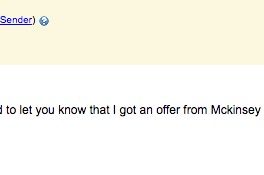Business Coach | Franchise Consultant (Not Sales)
Here are a few sample job advertisements for business coach roles…
The Cure for Career Confusion
Here are a few sample job advertisements for business coach roles…
Use this checklist to be sure your new resume is as effective as possible…
Name of supervisor
Title
Name of Company
Street Address.
City, State, Zip Code
Dear Name of Supervisor,
Please accept this letter as notice of my resignation from my position. My last day of employment will be (DATE).
I received an offer to serve as (title) of a Fortune 500 company, and after careful consideration, I realize that this opportunity is too exciting for me to decline.
It has been a pleasure working with you and your team over the last (x years). One of the highlights of my career was collaborating with you to (name of an exciting project or two).
I would like to help with the transition of my duties so that (name of the function) continues to function smoothly after my departure.
Thank you again for the opportunity to work for (Name of Company). I wish you and your staff all the best and I look forward to staying in touch with you. You can email me anytime at (email address) or call me at (telephone number).
Sincerely,
Your Name

When it comes to choosing an industry to work in, there are many variables.
Some people want to work in an industry that excites them. Others are focused on potential compensation, advancement opportunities, or job stability.
Job seekers interested in high compensation will want to consider industries with reputations for paying well. However, if you’re currently earning a high salary and are not able to take a (short-term) pay cut, you might have to stay in your current industry or a related industry.
If you’re searching for job stability, you’ll probably want to look for an industry that has less competition, is less sensitive to the economy, and won’t be impacted by changing technology or demographics.
A practical approach to changing careers can be to concentrate on newly developing, rapidly growing fields and industries that may lack a sufficient number of skilled workers.
When making a job or career change, it might be wise to choose several industries to target so you can see where you get interviews, which ones feel exciting, and who makes job offers – so you can then make the best career decision for you.
Here are questions to consider as you explore industries:
Note: Be sure to see the training video below that shows a very easy and quick way to see if the job titles that appeal to you are in the industries that you want to target
Here are some resources and strategies to gain insights into various industries:
Using a combination of these resources can provide a well-rounded understanding of various industries, helping job seekers identify where their interests, skills, and values align with potential career opportunities.
Watch this short training video to learn a very easy and quick way to see if the job titles that appeal to you are in the industries that you want to target:
Dealing with rejection may be the hardest part of a typical job search, even though rejection is a typical response. Nonetheless, dealing with job rejection can be equally tough, especially if you face a steady stream of rejection over time.
If you worked with me on creating your new resume, you can use this ‘Cheat Sheet’ that shows you how to easily and quickly use your new resume content to create a very effective LinkedIn profile.
Click on the link below to download the cheat sheet.
In this training video, I want to talk about an important way to evaluate alternative job and career ideas.
I’ve adapted the concept from the work of Marshall Goldsmith who is an executive coach and best-selling author of books like “What Got You Here Won’t Get You There” and “Mojo”.
It’s an innovative strategy to help you evaluate alternate job and career options so you don’t miss a good choice.